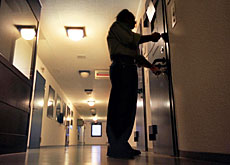Criminals face computer re-offender test

A new computer system designed to weed out criminal repeat offenders will help psychiatrists decide whether to release convicts back into society.
But the software has been criticised for being too rigid amid fears that psychiatrists will become over-reliant on the risk assessment programme when it goes live this month.
The sophisticated programme, called Fotres, processes up to 700 items of information on criminal behaviour and personality to conjure up the probability of someone committing new crimes on a scale of 0-4.
The information includes personality problems, relationship behaviour, the degree of planning involved in crimes, empathy towards victims, sexual predilections, method of crimes, crime motivation and tendency towards aggression.
Other checklist models typically use just 40 items that only focus on the subject’s history rather than looking at their current behaviour and measuring changes. Fotres is also the first programme to analyse the modus operandi of criminal activity.
Fotres has been put through its paces for the past five years in Germany and, more recently, at the secure psychiatric unit in Rheinau, near Zurich.
Risk assessment
It was designed by Frank Urbaniok, head of the psychiatry and psychology unit at Zurich city’s justice department.
Urbaniok told swissinfo that the system will help psychiatrists make better use of information and make them cover all angles before making a decision.
“Fotres collates all the relevant risk assessment information to form a comprehensive profile,” he said.
“It’s like having another person next to you, forcing you to assess all the information and ask all the relevant questions.”
Urbaniok also hopes that Fotres will standardise the process of evaluating the risk of re-offending and act as a central database in Switzerland.
Principles of psychology
But some experts, including Zurich psychiatrist Mario Gmür, fear that Fotres can’t be relied upon to make an accurate prediction.
“No machine can foresee the unexpected events in peoples’ lives. People always change their behaviour and do unexpected things,” Gmür told swissinfo.
“Fotres claims to be able to forecast things than cannot be predicted. It goes against the principles of psychology.
“You can sometimes predict the attitude of a certain group of people, but you can’t break it down to individuals. For example, you can say that a group of people are likely to vote in a certain way, but you can’t say how individuals will vote.”
Professional skills
Urbaniok denied that the computer software would make the final decision, arguing that by giving evaluators more information it will increase their flexibility.
“Fotres cannot replace clinical experience because you need professional skills and gut feelings in order to make a prognosis,” he said.
“A computer system does not necessarily make the procedure more rigid. In my experience rigid decisions are made when you don’t have enough information in enough detail. That is when you tend to lock people up.”
Otto Horbor, who has been testing Fotres in Rheinau, gave the system a cautious thumbs-up.
“It is much more sophisticated than other instruments,” he told swissinfo. “The assessment procedure can be improved by this detailed checklist which could help us to make a prognosis of future delinquency.
“Of course it cannot predict changes in circumstances of a person, but we rely on our clinical experience to make the final decision.”
swissinfo, Matthew Allen in Zurich
Fotres uses up to 700 items of information about a subject to evaluate the risk of re-offending.
The items include the range of offences committed, use of weapons, how determined the person was in committing the crime, the effect of therapy and honesty during therapy.
The programme rates the risk of repeat offending on a scale of 0-4.

In compliance with the JTI standards
More: SWI swissinfo.ch certified by the Journalism Trust Initiative










You can find an overview of ongoing debates with our journalists here . Please join us!
If you want to start a conversation about a topic raised in this article or want to report factual errors, email us at english@swissinfo.ch.